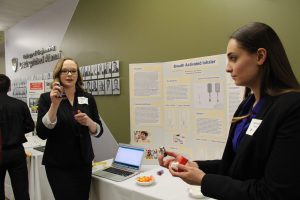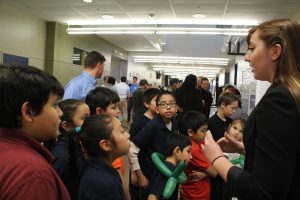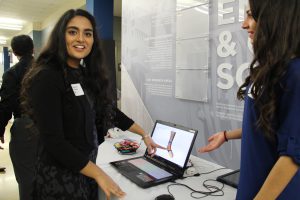Archive for March, 2017
Students, Faculty Present Research Updates at CDMI Spring Symposium
Friday, March 31st, 2017Scientific innovation and research is constantly making impact in the medical community, and the University of Toledo is contributing to the story.
The University of Toledo will host a biannual conference next week to review projects conducted through the National Science Foundation’s center on our campus. The conference will be held at College of Engineering in the Thomas and Betsy Brady Engineering Innovation Center on April 5 & 6, 2017 starting at 7:30 a.m. both days and end at 6:30 p.m. on Thursday and 1 p.m. on Friday. It will include presentations from students, faculty and staff as well as keynote speakers.
The Center for Disruptive Musculoskeletal Innovations (CDMI) was founded by Drs. Jeffrey Lotz, University of California at San Francisco (UCSF) and Vijay Goel, University of Toledo (UT) July, 2014 through the National Science Foundation’s (NSF) Industry/University Cooperative Research Center (I/UCRC) program. This center is one of only four I/UCRC’s in the area of health and safety. It joins industry members and faculty from the University of Toledo and UCSF to define and fund industry-inspired, precompetitive research projects and other collaborative initiatives. The CDMI maintains itself as a primary source for fundamental research on clinical outcomes and cost data, implant materials, tissue engineering, biosensors, implant testing protocols, and novel imaging in the musculoskeletal domain.
“To have an NSF Center is very prestigious,” said Dr. Vijay Goel, CDMI co-director and bioengineering and orthopaedic surgery professor. “To see that the faculty are working side-by-side with industry to translate research discoveries is exciting, and allows us to accelerate our efforts to create value for society.”
Through the CDMI, graduate and undergraduate students are assigned to funded projects, work on research, and provide quarterly progress reports during scheduled meetings. Industry members choose to become mentors for the some of the funded projects, thus giving the students valuable interaction and guidance as they work towards completing the research projects.
One of the exciting aspects of the bi-annual CDMI meeting is that the students will be presenting the CDMI project updates to the CDMI Industry Advisory Board (IAB). The IAB currently consists of high-level executives in 8 businesses or organizations in the medical field. This will be a unique training experience for many of our students since they will be able to meet and interact with many of the industry executives and get immediate feedback on their projects, Goel said. Some of the IAB members will be from companies like Depuy Spine, Orthofix, K2M, Zimmer, Osteonovus, Spinal Balance, and Medipol University, Turkey.
The best part about being involved in the conference, according to one of our masters students, is that the industry executives are receiving their resumes and seeing firsthand all the work the students have been doing. Over 85 students, faculty, and industry representatives will attend.
For more information, visit the CDMI website at www.nsfcdmi.org
Adapted from story by Lindsay Mahaney
Freshman Design Expo highlights student innovation
Friday, March 3rd, 2017College of Engineering students are innovators- beginning in their freshman year. On Friday, February 24th, the College of Engineering hosted the Freshman Design Expo. Approximately 30 student teams presented and discussed their projects with visitors, including fellow students, faculty, staff, and community members. Projects included a motorized skateboard, campus efficiency apps, and an inhaler for dispensing medication- among other innovative design solutions. WTOL11 highlighted some of the projects from the expo. View the WTOL11 coverage of the event here.
The College of Engineering has introduced several Freshman Design initiatives give first-year engineering students hands-on experience with entrepreneurship and introduce them to real world challenges faced by innovators and start-ups. The Mechanical, Industrial, and Manufacturing Engineering (MIME) Department integrates a Freshman Design Project in the course MIME 1000: Introduction to Mechanical Engineering. After learning about entrepreneurship in the classroom setting, students form teams and create a business plan to market novel devices. In the Department of Bioengineering, students have the option to participate in the BIOE Freshman Design Club. Teams work to address problems related to patient/doctor communication, hospital-acquired infection, and redesign of medical instruments and rehabilitation devices. Groups then develop and propose solutions to these real-world challenges. Several projects from these two departments were on display at Friday’s Expo.
Recognizing that the spirit to invent and create reaches across disciplines, the College of Engineering supports campus-wide entrepreneurial initiatives. The College of Engineering hosted the Expo in collaboration with the Freshman Engineering Entrepreneurship Development club (FEED), Young Entrepreneurship Society (YES), and the First Year Rocket Engineers, (FYRE) a social and professional organization designed to enhance the college experience for freshmen or first year engineering students. Scott McIntyre guides students in the Freshman Engineering Entrepreneurship Development club, (FEED) which teaches freshman students to apply an entrepreneurial edge to the theory and practice of engineering, with mentoring from upper class members of the sister organization, Young Entrepreneurship Society (YES).
The annual event is likely to grow in the coming years as the the College of Engineering seeks to incorporate a design component into the first year curriculum for all engineering students.




